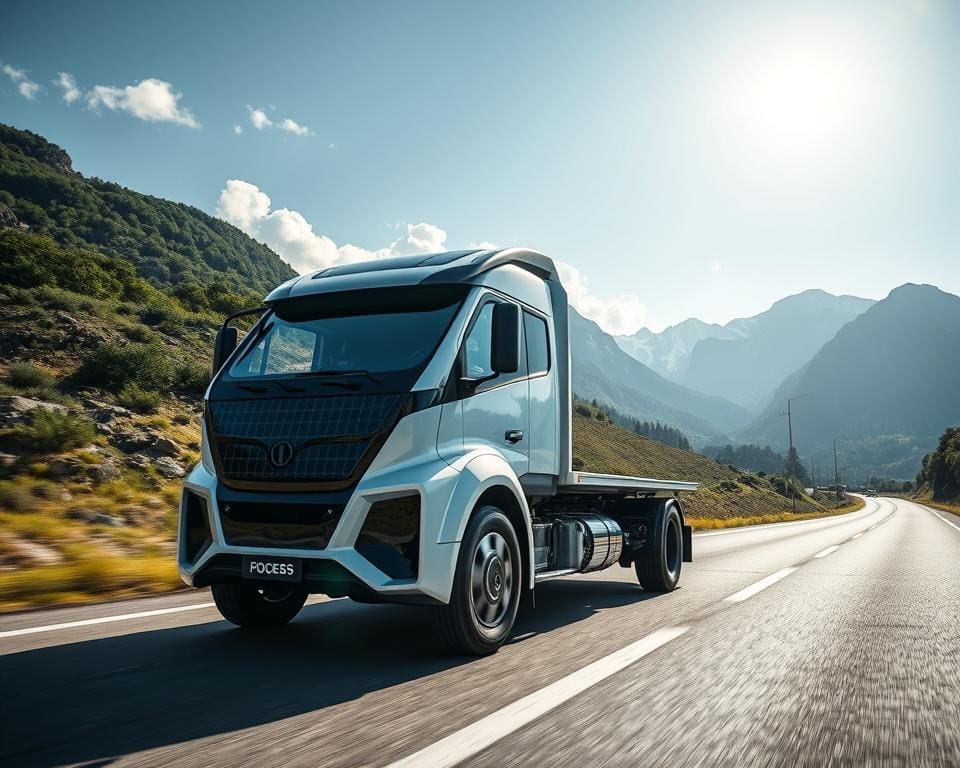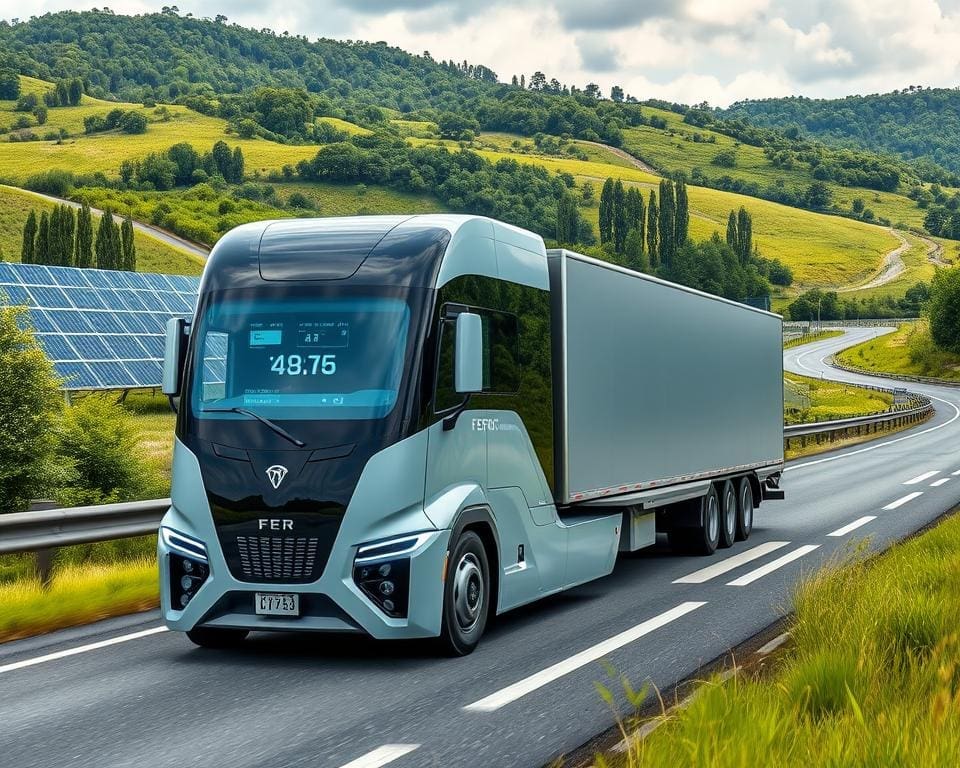In an era where climate change poses a significant threat, the transition to electric trucks is more than just a trend; it’s a necessity for sustainable haulage. These innovative vehicles represent a remarkable leap in technology, aiming to revolutionise the logistics industry while reducing carbon emissions. As the UK gears up for a more eco-friendly transport future, it is crucial to understand how electric trucks are paving the way towards achieving zero-emission standards. This shift not only highlights the urgency for cleaner transportation methods but also showcases the intricate technological advancements that fuel this monumental change.
The Rise of Electric Trucks
The logistics sector is witnessing a significant transition towards electric trucks, a development underscored by impressive market growth. This shift towards electric vehicles not only addresses environmental concerns but also aligns with the demand for more efficient and sustainable transport options.
Market Growth Trends
Recent research highlights a remarkable surge in electric truck adoption across the UK. The market growth in this segment reflects a broader trend towards greener transportation solutions. Companies are increasingly recognising the benefits of utilising electric vehicles, including reduced operational costs and lower emissions. As more businesses integrate electric trucks into their fleets, forecasts suggest that EV sales could double in the coming years. Enhanced battery technology plays a critical role in this progression, making electric trucks a more viable choice for logistics operations.
Government Initiatives in the UK
The UK government has implemented several initiatives aimed at promoting green transportation, driving the adoption of electric trucks. Recent policies include financial incentives and subsidies for businesses transitioning to electric mobility. These government initiatives not only support market growth but also contribute to the creation of a sustainable transport infrastructure. Companies are encouraged to invest in electric trucks, catalysing a broader shift towards environmentally friendly logistics solutions.

Electric Trucks: Tech Behind Sustainable Haulage
The evolution of electric trucks showcases incredible advancements in technology, revolutionising sustainable haulage. At the core of these vehicles lies electric motors, which operate with remarkable efficiency compared to traditional combustion engines. This efficiency not only reduces operating costs but also significantly contributes to lowering greenhouse gas emissions.
In the quest for optimised logistics, software innovations play a pivotal role. Tools such as route optimisation algorithms and telematics systems enhance operational performance. These technologies allow for real-time data analysis, enabling fleet managers to make informed decisions that maximise efficiency and sustainability.
As the demand for environmentally friendly transport options rises, the integration of cutting-edge technology in electric trucks stands as a beacon of hope. The potential for these innovations to transform the logistics landscape is profound, making the vision of sustainable haulage a reality.
Innovative Solutions in Electric Truck Technology
The evolution of electric trucks is marked by remarkable strides in technology, particularly in battery efficiency and charging infrastructure. Leading manufacturers such as Tesla and Rivian are pioneering innovative solutions that promise to transform the logistics landscape. A key aspect of this transformation lies in the enhancements to battery efficiency, which significantly extend the range and operational capabilities of electric trucks.
Battery Efficiency Improvements
Recent advancements in battery technology have led to substantial improvements in battery efficiency. Manufacturers are now utilising cutting-edge materials and designs that allow for longer-lasting power storage. These innovations enhance the overall performance of electric trucks, enabling them to handle heavier loads and travel greater distances without frequent recharging. As a result, operators can enjoy improved productivity while reducing their environmental footprint.
Charging Infrastructure Developments
The success of electric trucks heavily relies on a robust charging infrastructure. Efforts are currently underway to develop a comprehensive network of charging stations across the UK. This infrastructure not only supports rapid charging but also facilitates easier access for fleet operators. Initiatives by various companies aim to reduce downtime for charging electric trucks, enabling seamless integration into existing logistics operations.
Benefits of Sustainable Haulage
The transition to electric trucks in the logistics sector brings a wealth of advantages. Not only do these vehicles champion electric mobility, but they also contribute significantly to sustainability efforts by reducing carbon emissions. As more businesses recognise these benefits, the momentum towards adopting electric trucks continues to grow.
Reduction in Carbon Emissions
One of the most pressing issues in contemporary transport is the generation of carbon emissions. Electric trucks present a viable solution, producing zero tailpipe emissions. By embracing sustainable haulage, companies can proactively participate in mitigating climate change. This transition not only aligns with environmental policies but also plays a critical role in meeting international climate goals.
Cost Savings for Businesses
In addition to their environmental benefits, electric trucks offer substantial cost savings for businesses. The reduction in fuel costs is particularly striking, as electricity is often cheaper than diesel. Furthermore, electric vehicles have fewer moving parts, which translates into lower maintenance expenses over time. These financial benefits empower companies to invest in further innovations, paving the way for a more sustainable future.
Zero-Emission Vehicles and Their Impact
The transition to zero-emission vehicles represents a significant shift in the transportation landscape, especially concerning their role in commercial hauling. As businesses increasingly adopt these advanced technologies, a careful comparison with traditional trucks becomes pivotal in understanding their benefits and challenges.
Comparison with Traditional Trucks
Zero-emission vehicles, particularly electric trucks, offer distinct advantages over traditional diesel-powered vehicles. Consider the following aspects:
- Performance: Electric trucks provide instant torque, which can enhance acceleration and overall performance in urban settings.
- Operational Costs: Often lower in maintenance and energy expenses, electric trucks allow for improved budget management.
- Emissions Outputs: Traditional trucks contribute significantly to air pollution. In contrast, zero-emission vehicles produce no tailpipe emissions, leading to a substantial reduction in pollutants.
Long-term Environmental Effects
Adopting electric trucks not only transforms daily operations but also has profound long-term environmental effects. By decreasing reliance on fossil fuels, businesses can contribute to:
- Cleaner Air Quality: Reduced emissions from zero-emission vehicles help alleviate smog and improve overall air quality, particularly in metropolitan areas.
- Lower Greenhouse Gas Emissions: Transitioning to electric trucks significantly cuts down greenhouse gases, which are critical in tackling climate change.
- Noise Reduction: Electric trucks operate quietly compared to their traditional counterparts, contributing to less noise pollution in urban environments.
Electric Mobility in Logistics
The integration of electric mobility in logistics is advancing rapidly, proving to be a pivotal change in the industry. Leading companies are setting remarkable examples through electrified fleets, illustrating how sustainability can be successfully intertwined with operational efficiency. These case studies showcase the tangible benefits of adopting electric trucks, as well as the collaborations essential to fostering innovation in green transportation.
Case Studies of Electric Fleets
Prominent organisations, such as DPD and UPS, are paving the way for electric mobility within logistics. These fleet transitions not only demonstrate a commitment to reducing carbon footprints but also highlight improvements in delivery efficiency. The electrification of operations has led to:
- Significant reductions in maintenance costs due to fewer moving parts.
- Enhanced delivery capabilities in urban areas thanks to the reduced noise levels of electric trucks.
- Positive customer reception, driven by growing awareness of environmental issues.
Partnerships for Green Transportation
Collaborative efforts between logistics firms and technology providers are crucial in advancing electric mobility. Partnerships aim to enhance charging infrastructure and improve battery technology, creating synergies that bolster green transportation initiatives. Such collaborations can result in:
- Development of tailored logistics solutions that meet the unique needs of clients.
- Innovative charging solutions that support fleet operations in urban settings.
- Joint ventures focusing on research and development to optimise electric transport systems.
These concerted efforts exemplify how electric mobility is reshaping logistics, leading to a more sustainable future.
Challenges Facing Electric Truck Adoption
The transition to electric trucks brings with it a unique set of challenges that must be addressed to ensure successful adoption within the logistics sector. As the industry strives for greener alternatives, understanding and overcoming these hurdles is vital for widespread acceptance.
Range Anxiety and Customer Perceptions
Range anxiety remains a significant obstacle to electric truck adoption. This concern arises primarily from inadequate charging infrastructure and the perceptions regarding the capabilities of electric trucks. Many potential users fear that their vehicles may not have sufficient range to complete essential routes, creating hesitancy in making the switch.
Customer perceptions play a crucial role in this scenario. Misunderstandings regarding the efficiency and reliability of electric trucks often stem from a lack of knowledge about advancements in technology. Addressing these customer perceptions through targeted education initiatives can help alleviate concerns and build confidence in new electric models.
To further support the transition, several approaches can be considered:
- *Expanding charging networks* to make electric vehicle use more convenient and reliable.
- *Providing detailed information* about the performance and efficiency of electric trucks.
- *Showcasing testimonials* from companies successfully using electric trucks to share positive experiences.
Future of Eco-Friendly Logistics
The landscape of eco-friendly logistics is poised for significant transformation as we move towards an increasingly sustainable future. Key innovations promise to reshape the industry, making greener transport solutions not only viable but preferable for companies committed to reducing their environmental impact. Understanding these upcoming advancements can inspire confidence in the ongoing evolution of the transport sector.
Innovations on the Horizon
Innovations such as hydrogen fuel cell technology and automation in electric truck fleets are leading the charge in the realm of eco-friendly logistics. These advancements can facilitate:
- Enhanced Efficiency: Improved energy consumption and operational effectiveness.
- Increased Range: Extended travel distances between refuels or recharge sessions.
- Lower Costs: Reduced total cost of ownership through advancements in technology.
Potential Market Disruptors
The market could experience disruptions from several emerging players, including new entrants focusing on electric trucks and innovative logistics solutions. Shifts in consumer demand towards sustainable practices further challenge traditional frameworks. Key disruptors might include:
- Startups: Companies leveraging cutting-edge technology to create more sustainable logistics solutions.
- Established Brands: Traditional logistics firms adapting to new eco-friendly demands.
- Policy Changes: Regulations encouraging or mandating a shift towards low-emission transport methods.
Clean Energy and the Transportation Sector
The integration of clean energy into the transportation sector presents a transformative opportunity, especially for electric trucks. By harnessing renewable energy sources such as solar, wind, and hydro, fleets can ensure that their vehicles are powered by truly sustainable energy. This shift not only supports the vital aim of reducing carbon footprints but also enhances the overall effectiveness of sustainable haulage strategies across the industry.
Implementing clean energy solutions within charging infrastructures is essential. Forward-thinking companies are investing in solar-powered charging stations, which not only reduce reliance on fossil fuels but also create a more resilient energy model for transportation. By making this commitment, businesses can contribute significantly to the establishment of a circular economy, where sustainability and resource management are at the forefront of transportation operations.
The drive towards electric trucks powered by clean energy epitomises a forward-looking vision for the future of logistics. With collective effort and investment in innovative solutions, the transportation sector can position itself as a leader in environmental responsibility while fulfilling the demands of an ever-evolving market. The journey towards a cleaner, greener future is underway, and now is the time for all stakeholders to embrace this opportunity for positive change.









